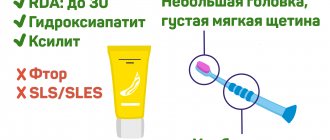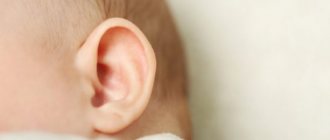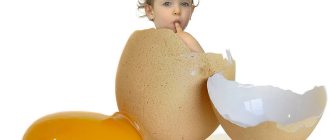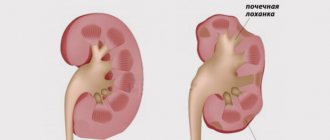Important: If the child has already had an ultrasound, it is advisable to bring data from previous ultrasound examinations. This will help the doctor assess the dynamics of changes.
Preparation for ultrasound of the upper abdomen (liver, gall bladder, pancreas, spleen) in children
Preparation for ultrasound of the abdominal organs for children in the first year of life:
Ultrasound of the abdominal organs in infants is optimally performed when the last meal was 2 hours before the examination, i.e. You can make an appointment with your doctor before your next feeding.
Preparation for ultrasound of the abdominal organs for children over one year old:
Ultrasound of the abdominal organs is performed on an empty stomach in children over one year of age.
Two days before the test, foods that contribute to increased gas formation (bread, fruit, sauerkraut) are excluded from the diet.
On the day of the study, it is recommended not to eat anything (including chewing gum, sweets), not to drink anything, and not to brush your teeth.
Fulfillment of these conditions is extremely important, because otherwise, it is impossible to reliably assess the condition of the internal organs; they will be partially covered (shielded) by the contents of the stomach. Swollen intestinal loops also complicate the study, so consult your doctor about the need to take antifoam medications (for example, espumisan) in advance.
Preparation for examination of the kidneys and urinary tract in children
Approximately 1.5 - 2 hours before the time of the expected ultrasound, the child should urinate and then drink water. It should be remembered that the child must urinate first and then drink water. Instead of water, you can offer tea, compote; you should not give sparkling water and milk.
These recommendations are designed to ensure that the study is as informative as possible. Organs are better visible (visualized) when the bladder is moderately full and there is no excess gas formation in the intestines (this is why the point about milk and carbonated water is indicated).
Approximate amount of fluid recommended depending on age:
- Up to a year – we cannot control the process
- 1-2 years - how much he drinks, preferably at least 100 ml (half a glass);
- 3-7 years - 1 glass;
- 8-11 years - one and a half glasses;
- teenagers - 2 glasses;
Types of ultrasound examinations for a child (ultrasound) that do NOT require special preparation before performing:
- Ultrasound of the brain (neurosonography)
- Ultrasound of the heart (EchoCG)
- Ultrasound of the hips and other joints
- Ultrasound of the thyroid gland
- Ultrasound of the thymus (thymus gland)
- Ultrasound of lymph nodes and other superficial structures
Important: All types of ultrasound are best carried out before other studies (for example, taking a blood test), and those that do not require special preparation (see above) - on a full stomach so that the children are calm, do not cry, and the examination is as complete as possible. full-fledged.
To make an appointment for an ultrasound, call
Call and our administrators will definitely help you
8
you can also:
or
Indications
Ultrasound diagnostics is mandatory for children at 1 month, 7 and 14 years of age.
Newborn babies are examined to exclude congenital defects. An ultrasound of the abdominal organs is also performed in a child when the following symptoms appear:
- frequent nausea;
- vomit;
- heartburn;
- bloating;
- discomfort in the right hypochondrium;
- sour belching;
- disturbance of appetite and stool;
- constant pain in any organ;
- skin rashes.
During diagnosis, the doctor can determine the contours of the organs being examined, their location, pathological changes in the tissues and the size of the tumors (if any). The method is also indispensable during treatment, when you need to evaluate its effectiveness.
Due to the absence of radiation exposure, the method is harmless to the body, so it is used even for babies from the first day of life. In addition, ultrasound diagnostics is highly informative and accessible.
Why does a child need an ultrasound?
This method of examination is very informative and has been used in the practice of pediatricians for diagnosis for more than 20 years.
Nowadays, it is difficult to imagine monitoring the health of our children without ultrasound examinations. To make such a statement about the safety of ultrasound, we have the right, because during this time a lot of research has been carried out in this area and many scientific articles have been written on the issue of the safety of ultrasound exposure on the child’s body.
If we continue to compare ultrasound in terms of harmlessness, for example, with X-ray, MRI (magnetic resonance therapy), FLG (fluorographic examination), SCT, then unlike them, ultrasound waves do not contain radiation exposure and, accordingly, do not irradiate the body, including children .
Children like ultrasound diagnostics; there is no pain or discomfort and it is carried out in a calm environment.
Preparing a child for an ultrasound of the abdominal organs
To get accurate results, you need to know how to prepare for an abdominal ultrasound and follow your doctor's recommendations.
For newborns, there is only one rule - the last meal 4-5 hours before diagnosis, water 1 hour before. If the child is over a year old, preparation is as follows:
- Diet - for two or three days you should stick to a light diet: cereal porridge with water, low-fat steamed fish and poultry, low-fat cheese. Prohibited foods are bread and pastries, legumes, milk, fatty, fried, spicy and overly salty foods, vegetables, carbonated drinks, confectionery.
- Emptying the bowel - the night before the procedure, an enema is done or laxatives are taken as prescribed by the doctor.
- Fasting - the last meal should be 8 hours before the ultrasound examination.
If your child is taking any medications, you must inform your doctor. They may need to be canceled the day before the procedure.
What needs to be done before the examination?
An important element of an ultrasound examination of a child’s abdominal organs is proper preparation. First of all, you will need to refrain from eating before the procedure. The ideal time period for an ultrasound specialist would be seven to eight hours.
However, any mother knows that a baby is not always able to withstand even a couple of hours without food. Therefore, it is necessary to feed the child two hours before the examination with something light, for example, milk or formula.
For older children, the main problem is the fear of visiting the doctor. Mental preparation will help here. Explain to the child the essence of the procedure, promise that there will be no scary syringes or injections.
So in what cases should an abdominal ultrasound be performed on a child?
Ultrasound is not scary! Show the children this photo?
How is it carried out?
On the day of diagnosis, the child should be dressed in comfortable clothing so that the parts of the abdominal cavity being examined can be easily opened during the procedure.
Algorithm of the doctor’s actions:
- the patient is placed on the couch;
- the area of the abdomen being examined is freed from clothing;
- A special hypoallergenic gel is applied to the diagnostic sensor;
- to get an image on the screen, the doctor slowly moves the sensor over the child’s abdomen;
- During the procedure, the specialist may ask the patient to lie on his side or hold his breath for a few seconds.
At the end of the diagnosis, the doctor deciphers the results and gives them to the child’s parents. The average procedure time is about 10–15 minutes. If several organs are to be examined at once, the examination will take longer.
How to prepare a child for an ultrasound?
You need to take a towel with you to lay on the couch and lie down on it, as well as a diaper to wipe off the gel after the procedure, but in some medical institutions this is not required, since they are equipped with disposable material. The child should be dressed so that examination organs can be easily reached.
If the examination requires preliminary preparation, then it is necessary to fulfill all the requirements for improvement and obtain as much information as possible about the organ being examined.
Ultrasound for which no preparation is required.
- NSG (neurosonography) or ultrasound of the brain.
- Hip joints.
- Hearts ECHO.
- Thyroid gland.
- Lymph nodes.
- Salivary glands.
- Vessels
- Muscle
- Soft tissues.
- Organs of the scrotum.
- Mammary glands - carried out in the first 10 days of the menstrual cycle.
Ultrasound for which preparation will be required.
- Liver.
- Gallbladder.
- Spleens.
- Pancreas.
- Adrenal glands.
- Stomach.
- Bladder and kidneys.
- Small pelvis.
Indications for ultrasound of the child's abdominal cavity.
A referral for ultrasound is issued by a pediatrician, and can also be issued by a specialist - a gastroenterologist. Why does a child need an ultrasound? Babies who are one month old undergo examinations to identify any pathology or to make sure that it does not exist. Ultrasound of the abdominal organs is mandatory:
- Abdominal injury.
- Epigastric pain.
- Pain in the right or left hypochondrium.
- Presence of bloating.
- Complaints of bitterness in the mouth.
- Changes in the skin (yellowness).
- Changes in the sclera of the eyes (jaundice).
If your child has been prescribed an examination such as an ultrasound of internal organs, then you will be examined:
- Liver.
- Gallbladder.
- Spleens.
- Stomach.
- Kidney.
- Bladder.
- Pancreas.
How to prepare a child for an abdominal ultrasound?
The main reason for the distortion of the ultrasound result is gas formation in the intestines, in order to avoid this and properly prepare for an ultrasound of the abdominal cavity, since all the organs listed above are located in it, it is necessary to remove from the diet foods that cause increased accumulation of gases (apples) for at least three days , peas, beans, dairy products, brown bread, juices, baked goods, sparkling water). It is also necessary to take activated carbon, enzymes to improve digestion, Micrasim, and Espumisan to eliminate gas formation.
This procedure is carried out on an empty stomach; the break should be about ten hours from eating; taking any medications is also not recommended unless prescribed by a pediatrician as vital. And if your baby is an infant, then the break between feedings is at least 3 hours, this means that an ultrasound can be done 3 hours after feeding, if the child is bottle-fed, then the break increases to 4 hours.
Preparing for a kidney ultrasound?
The same goes for examining the abdominal organs, since gas formation can complicate and distort ultrasound data.
How to prepare a child for an ultrasound scan of the adrenal glands?
A vegetarian diet is prescribed for 5 days. Allowed products: various cereals, peas, beans, potatoes, grain bread, pasta, natural juices (preferably your own). In the morning, a laxative is taken, which must be prescribed by a doctor, the examination itself is carried out on an empty stomach, infants can have an ultrasound scan 3-3.5 hours after feeding.
Preparing for a bladder examination?
This procedure is performed on a full bladder. To do this, you need to drink 200-800 ml in 1-1.5 hours. liquids, water or drinks only without gases.
Each child is individual, some can tolerate a full bladder for a long time, while others cannot, knowing your child, you need to give him fluids for such a time that he can tolerate. But ideally, to carry out the procedure, the child should really want to urinate; this is very important for making a diagnosis, and the doctor will see an excellent image of the organ on the screen, which will allow them to determine pyelectasis and the full volume of the organ.
In order to determine the volume of residual urine, after an ultrasound, the child will need to urinate, and the doctor will again examine the bladder and pay attention to the remaining amount of urine in the bladder, thereby determining whether the bladder has been completely emptied. Infants need to be fed or watered 20-30 minutes before the examination.
Prepare your child for an ultrasound of the stomach?
Before the examination, the child is prohibited from feeding for 5-7 hours. It is necessary to take water without gases with you, after examining the empty organ, the doctor will suggest drinking water and will observe how the water flows from the esophagus into the stomach, it will also be possible to see the lower parts of the esophagus; in infants, 3 hours from feeding are also maintained.
How to prepare a child for an ultrasound examination of the thyroid gland.
There is no need for any special preparation, you just need to know how much the child weighs and what height he has, and for recommendation purposes, do the procedure on an empty stomach, as pressing the sensor on the neck area can provoke vomiting. And the examination of the gland itself will not take much time.
How to prepare a child for a pelvic ultrasound for boys (scrotum).
No special preparation is required, but it is necessary to do genital hygiene before the ultrasound. And for an ultrasound of the prostate gland, a full bladder is a prerequisite, which will allow a better view of the organ on the monitor screen.
Cases in which ultrasound of the abdominal organs is necessary for children
Appointment of ultrasound for a child
From the first days of life, the baby begins to actively explore the world around him through physical activity and sensations through the oral cavity. It is through the mouth that the baby can capture microbes or dangerous objects into the body, which can penetrate into the abdominal organs. For these and many other cases, ultrasound examination is mandatory.
To get an ultrasound for preventive purposes, you need to take a special referral for your child, which is prescribed by a pediatrician or through a gastroenterologist. For newborns, ultrasound is necessary to diagnose various types of pathologies in the baby, in the early stages of their development, or for preventive purposes.
An ultrasound examination allows you to identify the types of injuries a child has received in the structure of internal organs, in cases where the baby feels discomfort in the abdominal cavity.
Unpleasant and painful sensations can be observed in a child in the area:
- Right hypochondrium.
- In a stomach.
- In the oral cavity.
- The baby may complain of girdling pain and increased gas formation.
In such cases, an ultrasound is simply necessary. Sometimes children develop yellowness of the sclera or skin, signaling an immediate visit to a medical facility for specialist advice.
Read: Effective diagnosis of appendicitis using ultrasound











